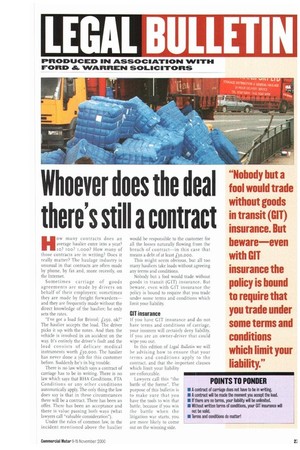Whoever does the deal there's still a contract
Page 29

If you've noticed an error in this article please click here to report it so we can fix it.
How many contracts does an average haulier enter into a year? To? Too? T,000? How many of those contracts are in writing? Does it really matter? The haulage industry is unusual in that contracts are often made by phone, by fax and, more recently, on the Internet.
Sometimes carriage of goods agreements are made by drivers on behalf of their employers; sometimes they are made by freight forwarders— and they are frequently made wiihout the direct knowledge of the haulier; he only sets the rates.
"I've got a load for Bristol; 1250, ok?" The haulier accepts the load. The driver picks it up with the notes. And then the vehicle is involved in an accident on the way. It's entirely the driver's fault and the load consists of delicate medical instruments worth £30,000. The haulier has never done a job for this customer before. Suddenly he's in big trouble.
There is no law which says a contract of carriage has to be in writing. There is no law which says that RHA Conditions, FTA Conditions or any other conditions automatically apply The only thing the law does say is that in these circumstances there will be a contract. There has been an offer. There has been an acceptance and there is value passing both ways (what lawyers call "valuable consideration").
Under the rules of common law, in the incident mentioned above the haulier would be responsible to the customer for all the losses naturally flowing from the breach of contract—in this case that means a debt of at least £30,000.
This might seem obvious, but all too many hauliers take loads without agreeing any terms and conditions.
Nobody but a fool would trade without goods in transit (GIT) insurance. But beware, even with GIT insurance the policy is bound to require that you trade under some terms and conditions which limit your liability.
WI insurance Ii you have GIT insurance and do not have terms and conditions of carriage, your insurers will certainly deny liability. If you are an owner-driver that could wipe you out.
In this edition of Legal Bulletin we will be advising how to ensure ihat your terms and conditions apply to the contract, and that the important clauses which limit your liability are enforceable.
Lawyers call this "the battle of the forms". The purpose of this bulletin is to make sure that you have the tools to win that battle, because if you win the battle when the litigation war starts, you are more likely to come out on the winning side.




































































































